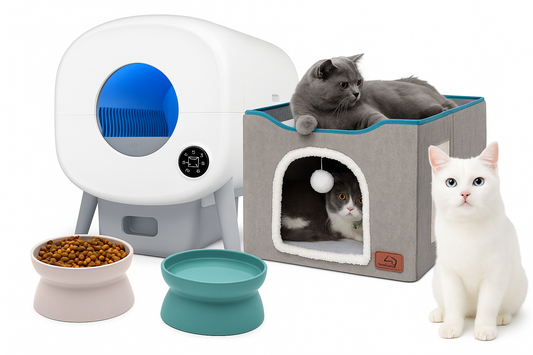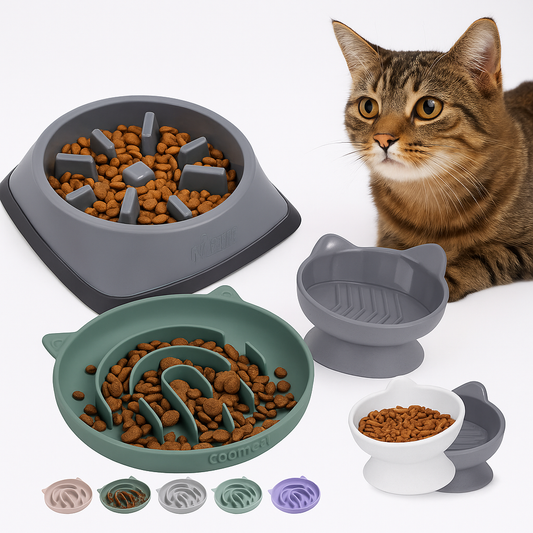
How to Tell If Your Cat Is Sick (Before It’s Too Late!)
Cats are masters of disguise when it comes to illness. Unlike dogs, who often make it clear when they’re feeling under the weather, cats instinctively hide signs of sickness. This is why early detection is crucial—by the time symptoms are obvious, your cat may already need urgent medical attention.
So, how do you know if your feline friend isn’t feeling well? Below, we’ll break down the early warning signs, when to call the vet, and what you can do to keep your cat healthy.
1. Recognizing Common Signs of Illness in Cats
Here’s a quick-reference table of common symptoms and what they might indicate:
| Symptom | Possible Cause | When to See a Vet |
|---|---|---|
| Loss of appetite | Dental issues, kidney disease, digestive problems | If it lasts more than 24 hours |
| Vomiting | Hairballs, food intolerance, poisoning, infection | Frequent or contains blood |
| Diarrhea | Stress, dietary changes, infections | If it persists for more than 24 hours |
| Excessive hiding | Pain, anxiety, illness | If behavior is sudden or prolonged |
| Unexplained weight loss | Diabetes, hyperthyroidism, cancer | Noticeable weight drop in short time |
| Lethargy | Anemia, heart disease, infections | If it lasts more than a day |
| Changes in thirst | Kidney disease, diabetes | Increased or decreased drinking |
| Labored breathing | Asthma, respiratory infection, heart disease | If breathing is rapid or strained |
| Unusual aggression | Pain, neurological issues, stress | If behavior changes suddenly |
💡 Pro Tip: If you notice more than one of these symptoms at a time, don’t wait—schedule a vet visit as soon as possible.
2. Changes in Eating & Drinking Habits
A cat’s eating and drinking patterns can reveal a lot about their health. Here’s what to watch for:
-
Eating Less: Cats rarely stop eating without reason. If your cat is skipping meals, it could be a sign of dental pain, digestive issues, or kidney disease.
-
Drinking More Water: Excessive thirst is often linked to diabetes or kidney problems.
-
Sudden Increased Appetite: If your cat is eating more than usual but losing weight, it could be hyperthyroidism or diabetes.
- Vomiting After Meals: If this happens frequently, consider checking for food intolerance, hairballs, or an underlying digestive issue.
3. Behavioral Changes: Is Your Cat Acting Strange?
Cats are creatures of habit, so sudden behavioral changes can indicate health problems. Some red flags include:
-
Sleeping More Than Usual – If your normally playful cat is suddenly lethargic, it could signal illness.
-
Avoiding Human Contact – If your usually affectionate cat is hiding or acting distant, they might be in pain.
-
Excessive Grooming or No Grooming at All – Overgrooming can be a sign of skin irritation or anxiety, while poor grooming can indicate arthritis or dental issues.
- Sudden Aggression – If your cat hisses or swipes when touched, they may be experiencing pain.
4. Litter Box Clues: What Your Cat’s Waste Says About Their Health
Your cat’s litter box habits can reveal early signs of illness. Keep an eye out for these warning signs:
| Litter Box Issue | Possible Cause | When to Call the Vet |
| Straining to urinate | Urinary tract infection (UTI), bladder stones | If straining lasts more than a few hours |
| Frequent urination | Diabetes, kidney disease | If frequency increases significantly |
| Blood in urine | UTI, bladder stones, kidney disease | Immediately |
| Constipation | Dehydration, megacolon, dietary issues | If lasting more than two days |
| Diarrhea | Parasites, food intolerance, infections | If persistent for more than 24 hours |
💡 Pro Tip: If your male cat is straining to urinate but producing little to no urine, get emergency veterinary care immediately—this could indicate a life-threatening urinary blockage.
5. Changes in Grooming & Appearance
A healthy cat takes pride in grooming, but sudden changes in their fur condition could signal health issues:
-
Dull, unkempt fur – May indicate arthritis (making grooming painful) or illness.
-
Excessive shedding – Can be caused by stress, allergies, or nutritional deficiencies.
- Lumps, sores, or scabs – Might be a sign of infections, skin cancer, or parasites.
6. When Should You Call the Vet?
If you’re unsure whether your cat needs medical attention, follow this general guideline:
Emergency Situations (Go to the Vet Immediately)
- Difficulty breathing
- Sudden paralysis or loss of balance
- Seizures
- Repeated vomiting or diarrhea
- Not urinating for 24+ hours (especially male cats)
Signs That Warrant a Vet Visit Within 24-48 Hours
- Loss of appetite for more than 24 hours
- Increased thirst with weight loss
- Unexplained weight loss or gain
- Chronic coughing or sneezing
Final Thoughts: Be Proactive About Your Cat’s Health
Cats can’t tell us when something is wrong, so it’s up to us to pay attention to subtle changes. By knowing what to watch for—eating habits, behavior, litter box clues, and grooming patterns—you can catch potential health problems before they become serious.
The key to keeping your cat healthy is regular vet check-ups, a good diet, and monitoring small changes in their routine. If in doubt, trust your instincts and call your vet—it’s always better to be safe than sorry.
😺 Have you ever caught an illness early in your cat? Share your experience in the comments below!



